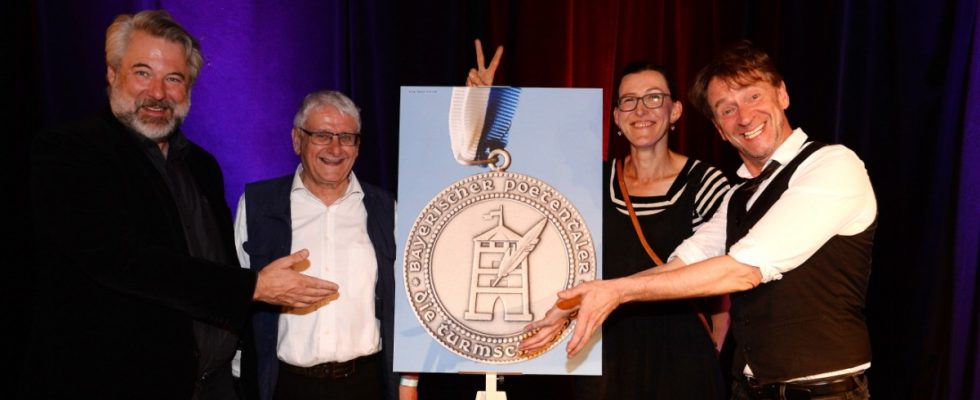This is off to a good start! Introducing Ecco Meineke as the first prize winner turns out to be a really good idea. As soon as he has the Bavarian Poet Taler in his hand, after words of thanks to the admirably freely laudatory Wolfgang Oppler, he starts with the seemingly far-fetched story of Omar Bongo, the ex-president of Gabon. He was in power for 41 years, his son Ali-Ben Bongo Ondimba added a few more years before the military put the Bongos away after 56 years – which in turn gave Meineke an idea: “I’m really not a military fan, but: Bavaria has been ruled by the CSU for more than 60 years…” Meineke shouts into the rumbling audience: “You don’t have to take back democracy, you just have to use it.” He tells the elephant in the room the following: “We don’t need people who moderate six million youthful sins anymore!” Hey, whoops, what a start to the evening!
Josef Kirner, Munich tower writer and host.
(Photo: Robert Haas)
“You don’t have to take back democracy, you just have to use it,” said Ecco Meinecke in his acceptance speech.
(Photo: Robert Haas)
Since 1961, the Münchner Turmschreiber writers’ association has awarded the Poetentaler to “personalities and institutions who have made a special contribution to art and culture in Bavaria,” as it is said. Among the more than 200 award winners are names such as Eugen Roth, Michael Ende, Janosch, Carl Orff, Enoch zu Guttenberg, Dieter Hildebrandt, Gerhard Polt, Werner Herzog, Jörg Hube, the Roider Jackl and the Augsburger Puppenkiste as a whole. A squad you’re happy to join.
That evening, four more Poetentalers will be put into circulation, and the fact that this is happening in the slaughterhouse is a nice coincidence in Meineke’s case, as the outrageously ageless 62-year-old with the rogue charm has been performing here for 35 years as Ecco DiLorenzo and his soul formation Innersoul on, preferably in a snow-white suit. These are now legendary performances that Oppler attributes to a “brilliant elegance”. The award winner remembers how, at the end of the 1970s, he walked with Oppler and duo friend Werner Schmidbauer from the U6 on Implerstrasse to Dreimühlenstrasse, to the Robinson Liederbühne, “to get to know other artists”, hashtag “mutual illumination of the arts”. It worked brilliantly: the list of all his bands and projects goes beyond the scope.
Martina Schwarzmann, who was also awarded the Taler, also had her breakthrough at the Schlachthof thanks to Otti Fischer, but owes her stage career to such a mixed show, as they say today. She had heard of the legendary poets’ get-together, but never dared to go. When she finally went, she was amazed at “how many good, unknown people there were – and that’s still the case today.” For a long time she only performed in garages or at birthday parties, founded the Munich Brettl Mafia with colleagues who were also unbooked – and actually managed to get one or two gigs, albeit sometimes with unfair means, i.e. alcohol. Once, just so that the event would take place, she bribed two groups of friends with a three-liter bottle of Asbach: “The entire fee went to that.”
Prize winner Dieter Fischer also came to the “Rosenheim Cops”, to the “Kaiser von Schexing” and to the “comedy nobility” that he had admired since childhood: from a fish seller in the Kaufhof on Marienplatz, the native of Freising blossomed into a “stroke of luck for Bavarian television”, such as As moderator Jürgen Kirner puts it: “You are incredibly authentic.” The same applies to the poet Josef Wittmann, who is praised for the “critical power of his texts” and generally for his clarity and perspicacity. A thaler will be awarded posthumously to the tower writer Monika Bittl, who died in October last year and caused a sensation with her bestseller “Single Parents with a Husband”. In the eulogy, Michaela Karl is sure that her good friend is watching everything from above, “with wheat beer, a cigarette and Eugen Roth next to her.”

